- Home
- Rodman Philbrick
Who Killed Darius Drake?: A Mystery
Who Killed Darius Drake?: A Mystery Read online
To Bonnie Verburg, for always pointing me in the right direction, and for lending me her service dog
Contents
Title Page
Dedication
Chapter One: Bad Things Will Happen
Chapter Two: Not Yet Dead
Chapter Three: A Bloodstained Question
Chapter Four: Meet My Fist
Chapter Five: You Can’t Argue with a Lunatic
Chapter Six: What Selma Saw
Chapter Seven: Bash Man
Chapter Eight: Cupcake Sad
Chapter Nine: The Secret in the Stacks
Chapter Ten: Hiding in Plain Sight
Chapter Eleven: What Pop Pop Means
Chapter Twelve: The Red Menace
Chapter Thirteen: What Sisyphus Shared
Chapter Fourteen: Why Trust a Criminal?
Chapter Fifteen: He Went Wicked Gaga
Chapter Sixteen: An Interesting Factoid
Chapter Seventeen: Finding Pop Pop
Chapter Eighteen: Who Man Who
Chapter Nineteen: Happy Father’s Day
Chapter Twenty: Infinitely Worse
Chapter Twenty-One: The Lion in His Den
Chapter Twenty-Two: One Final Question
Chapter Twenty-Three: Back in the Stacks
Chapter Twenty-Four: The Witch House Clue
Chapter Twenty-Five: Knock Knock
Chapter Twenty-Six: The Trouble with the Future
Chapter Twenty-Seven: The Search Begins
Chapter Twenty-Eight: All for One
Chapter Twenty-Nine: If We Scream for Help
Chapter Thirty: When Something Astonishing Happens
Chapter Thirty-One: What Lies Beyond
Chapter Thirty-Two: The Heart Is a Good Place to Start
Chapter Thirty-Three: What the Cat Dragged In
Chapter Thirty-Four: What’s in Your Pocket?
Chapter Thirty-Five: And Then Nothing
Chapter Thirty-Six: TV News Ticker
Chapter Thirty-Seven: Her Pink Baseball Cap
Chapter Thirty-Eight: Rumors Are Swirling
Chapter Thirty-Nine: This Mess Called Life
Afterword
About the Author
Also By the Author
Sneak Preview: The Big Dark
Copyright
WHATEVER YOU’VE HEARD about Darius Drake is probably wrong. Dead wrong. Some of the stories are lies, some are mistaken, and the rest were invented by Darius himself, to fool his enemies.
Enemies. Not school bullies, or mean kids that hated him, although there were plenty of those. I’m talking about real, grown-up enemies who wanted to steal the long-lost treasure Darius recovered and erase him from the world.
I know because I was his only friend.
Not that it started out that way. As far as I was concerned he was just another weirdo. This tall, skinny kid, all arms and legs, shooting up his hand at every opportunity, answering questions before the teacher even thought to ask them. Seemed like maybe he was sneering at those of us who didn’t know the answers. Plus he had thick reddish hair that kind of exploded from the top of his head, like an eruption from a hair volcano. Ugh. Girls saw him and rolled their eyes. The boys ignored him, if possible, and dissed him when necessary, to keep their distance. No one wanted to be seen in the vicinity of Darius Drake, and if he wouldn’t keep his distance, you persuaded some big, fat, scary-looking dude to back him off.
That would be me. Arthur Bash, thug-for-hire. Hand me a candy bar and point me in the right direction. In this case the end of a crowded cafeteria table where Darius had parked himself for lunch.
“Hey,” I say, looming over him. “Beat it.”
“Excuse me?”
“Sit somewhere else. This table is taken.”
“Ah,” he says, raising his chin. “And if I don’t?”
“Bad things will happen.”
He stands up, slump-shouldered, clutching his tray of gluey mac and cheese. “Any suggestions?”
“Huh?”
“Where I might dine undisturbed.”
I shrug, then point. “Over there. Empty table.”
He nods like a bobblehead doll and heads for the empty table.
I lower my bulk into the seat he’s vacated and inhale the Snickers bar in one fat bite.
Mission accomplished.
THEY SAY NEVER judge a book by its cover. That applies to me, too. I’m average height, but wide and strong and tough-looking. See me lumbering down the sidewalk with a scowl on my pudgy face, you might be inclined to cross the street. Many do.
If only they knew. A long time ago I learned that if you show fear around here you’re dead meat. So I make myself look mean and dangerous by scrunching my bushy eyebrows together and scowling. Grr. Sometimes I practice in a mirror and scare myself. Anyhow, kids started giving me candy bars when they wanted somebody frightened, and I’m always hungry, so I usually go along with it.
As a matter of fact I’m thinking about food the next time Darius Drake crosses my path. I’m heading home after school, trying to remember if there’s chocolate chip ice cream in the freezer or if I ate it the night before, when Darius appears out of nowhere. And he’s waving a candy bar like a conductor waving a baton at a really hungry orchestra.
“Arthur Bash,” he says. “They say you’re the toughest boy in school. You certainly look the part. Strange that I’ve never actually seen you hit anyone. I’m counting on that, actually.”
He watches me track the candy bar with my eyes.
“What do you want?” I say.
“I want you to do what you do. Look menacing. Don’t worry, you won’t have to fight anybody.”
“I’m not worried.”
“No? Good. Will three Snickers suffice?”
I hold out my hand.
“One as a down payment, two more upon completion?”
I shrug.
“It’s a deal, then,” Darius says, placing the candy bar in my fist. “You know the abandoned house on Rutgers Road?”
“That’s Stomper territory. Sketchy stuff happens in Stomper.”
“Not a problem,” Darius says brightly. “Not for the toughest kid in school.”
That’s when I know I’m in real trouble.
The Anthony J. Stompanado Housing Complex is named after some dead guy that used to be mayor of our little city, Dunbar Mills. If he knew what they made of his name he’d probably roll over in his grave. There are twelve three-story buildings in Stomper, and each building has eight units, so that covers every kind of miserable. There’s only one rule in Stomper Land: If you don’t live there, don’t go there. Strangers are not welcome.
The abandoned house on Rutgers Road isn’t officially part of the complex, but it’s right on the edge, and everybody knows about the house because it looks so Halloween, with a roof peaked high like a witch’s hat, and the windows boarded up, and a saggy old porch melting into the dirt. Supposedly there was a murder there, and that’s why the place hasn’t been sold or torn down. Half the kids in Dunbar Mills have broken into the place, or bragged they did, or slimed the outside with blood-red graffiti. Not me. I don’t believe in witches or ghosts, but as you know by now, I’m not as tough as I look, and one of the things that scares me is rotten floors. What if I fell through the floor and starved to death before they found me?
What an embarrassing way to die.
As we approach the creepy old house, Darius asks, “You scared?”
I shake my head. Throw in an extra scowl to make it convincing.
“I am,” he admits. “Could be dangerous. I mean, look at the place.”
“So what are we doing here?”
&n
bsp; “Observing. Checking numbers.”
“Numbers?”
“The street address. There’s nothing on the mailbox. Might be something on the front door.”
Darius edges up to the porch, squinting. Did I mention he wears glasses? Clunky glasses with thick lenses that make his eyes look like big blue eggs. He studies the peeling paint around the door and then scuttles back to where I’m waiting at the edge of the property.
“Numerical identification confirmed,” he says with a tight smile. “This is the place, Ace.”
I’ve no idea what he’s talking about until he pulls out a crinkled envelope and shows me the return address. “The street numbers fell off the building or were stolen,” he says. “But the marks are still there. 123 Rutgers Road. See? It matches.”
The envelope is addressed to Darius Drake, care of the Stonehill Home for Children. He’s not the only Stonehill kid in our school, but he’s the smartest, and for sure he’s the weirdest. There’s no name on the return address, just the street number and zip code.
“Nobody lives here, but nevertheless someone used this return address,” he points out. “Strange, isn’t it?”
“I guess.”
“Not as strange as this,” Darius says, handing me the letter itself. “Read it.”
I unfold the letter. There’s only one sentence, scrawled in rusty-brown ink.
Who killed Darius Drake?
“Dude,” I say. “You’re not dead.”
“Not yet,” he says.
MUST BE A million bricks in the Stonehill Home for Children. It has two fat chimneys rising from a steep slate roof and a bunch of small shiny windows that look like animal eyes. Dark glassy eyes reflecting the huge oak trees that hide the place from the road. Back in the old days it was Stonehill Academy, a private school for the sons of factory owners, and then later it became an orphanage. Not that they’re all orphans, at least not technically. Most of the kids in Stonehill have parents or family that can’t take care of them. Like in prison or on drugs, or maybe the kids can’t be placed in foster homes. Some have serious physical or mental disorders and need special care. Others have what they call temperament issues. Screamers. Biters. And then there’s Darius, who gets straight A’s but is just too strange to be adopted.
So he says.
I knew about the home—everybody does, all the kids—but this is my first time inside it. No surprise, the place creeps me out a little. Not because it’s spooky or scary, nothing like that. It’s actually kind of cheerful, in a sad-but-trying way. But it makes me think, what if it was me? What if both my parents died and nobody wanted me? Like that.
Anyhow, the nice lady in reception checks off my name on the visitor list and sends me up to Darius Drake’s room. I don’t know what I was expecting. Maybe something like a broom closet, or a cupboard under the stairs like Harry Potter. Turns out all the residents have their own bedrooms. Darius’s room is bigger than the others because it used to be an old science lab, from when the place had been a school. And Darius has filled the desk and cabinets with all kinds of scientific gizmos. Beakers, test tubes, microscopes, all that mad scientist stuff.
“Mr. Bash,” he says, ushering me in. “Welcome to my not-so-humble abode.”
“Hey,” I say.
He studies me, head cocked slightly to one side, like a bird studying a worm. “I deduce, from your expression, that this is your first visit to the Stonehill Home for Children.”
I nod.
“You’re tempted to feel pity, perhaps. The poor orphan boy. Boo-hoo. Well, don’t. Erase it from your brain. This is where I belong,” he says, pushing his thick glasses up his freckled nose. “My weirdness likes it here.”
My weirdness likes it here. I’ve no idea what he means by that. And I’m not sure I want to know. I’m not interested in a long explanation about how he got here, or boring stuff about the history of the Stonehill Home for Children.
I’m all about the candy bars.
Snickers, specifically. Perfectly chilled in the lab refrigerator.
He hands one to me, unwraps another for himself.
“Written in blood,” he says. “The anonymous letter.”
“No way.”
He holds up a slender test tube. “See the lines of sediment? Human blood. My tests were conclusive as to species. But there are seven billion humans on the planet. In an effort to narrow down the suspect pool, I sent a sample in for DNA testing, but that may take weeks.”
My tests were conclusive as to species. I mean, who talks like that? No wonder nerd alarms go off when Darius Drake is in the vicinity.
“I don’t get it,” I admit. “Why not use a pen or a marker to write the note? Why use blood?”
He shrugs. “I can only speculate. To make a point? Ink could be a joke. Blood you have to take seriously.”
“Okay. But what does it have to do with that rotten old house?”
“That’s the question, isn’t it? Why that particular address?”
For some reason Darius seems really pleased. A bloodstained question. Nothing makes him happier.
THE NICE LADY at the desk in the lobby smiles at me and Darius as he checks out.
“Destination?”
“Downtown. Might go to the library.”
“Very good.” She makes an entry in her desk computer. “Enjoy your day.”
I wait until we’re outside in the long curving driveway before asking, in a low voice, “They let you go, just like that?”
Darius chuckles. “Yeah, they do. I’m a resident, not an inmate. Some of the troubled kids can’t leave the grounds except on group trips, but I have privileged status. Also, I never cause trouble, keep my room tidy, talk to the counselor every month, and get straight A’s in school. I’m like the ideal resident, except I don’t want to leave.”
“Why not?”
He gives me a look. “Stonehill may not be normal to you, but it is to me. It’s my home.”
“Cool.”
Darius holds a finger up in the air, as if testing the breeze. “Changed my mind,” he announces. “We may go to the library—it’s one of my favorite destinations—but first we’re making a slight detour.”
So we go back to that rotten old place. The Halloween house. The wreck with a roof like a witch’s hat.
I’m not exactly enthusiastic about the idea. In fact, the closer we get, the less I like it.
“No way,” I finally say, halting in my tracks. “This is a truly bad idea.”
We’re about a block from the Stomper projects, having walked from Stonehill. A mile or so of Darius Drake running off at the mouth about his various scientific accomplishments, which include galvanic reactions in frogs’ legs, as well as testing for human blood. Trust me, you don’t want to know what a galvanic reaction is, not when it applies to dead frogs.
“Keep your candy bars,” I tell him, because I’m getting more and more nervous. “I’m not crossing the line into Stomper territory. For sure I’m not going inside that falling-down house. You can’t make me.”
“You already ate the candy bars. We have a contract.”
“I never signed a contract.”
“The first bite was an oral affirmation.”
That’s Darius trying to be funny, riffing on words. I didn’t get it until later, because at the time, when he said it, I was too scared to think straight. There are all kinds of rumors about Stomper, how outsiders have ventured into the complex and vanished without a trace. The scariest stories are about a Stomper resident called Scar Man, who is so ugly that just looking at him makes you go blind. That can’t be true, right? But I’d rather not find out, just in case.
“What do you think is in that crummy house, anyhow?” I ask. “A clue? Like one you’ll find with a magnifying glass? Only clue will be a fist in the face. Or worse.”
“I’m not afraid of hooligans,” Darius says cheerfully. “You’ll protect me. As per our contract.”
Hooligan. Another word that nobody uses. He
saunters across the street without looking back, as if convinced I’ll follow.
And like an idiot, I do. Not that I have any intention of fighting the locals, or anyone. No way. A Stomper shows his face, I’m out of there.
On our first visit I never got any closer to the creepy old house than the front yard. And Darius only got near enough to see where the street numbers had been before they rusted away or fell off. This time Darius walks right up to the front door and tries ringing the bell. Nothing. He raises a skinny fist and knocks.
The door creaks open.
He steps inside, into the shadows.
My brain is screaming NO WAY, but my stupid feet follow in his path. Up the rotten, creaky steps. Across the rickety porch. Into the same moldy darkness that just swallowed the so-called genius Darius Drake.
Naturally I’m expecting to fall through the floor and into a basement full of skeletons. But the floor seems surprisingly firm under my feet, and when my eyes finally adjust to the dim interior, there’s Darius with his hands on his hips and a smug look on his freckled face.
“See? Perfectly safe.”
The door slams behind me.
They say fat boys can’t jump, but I launch like a booster rocket. If the ceilings weren’t so high, I’d have bumped my head.
“Just the wind,” Darius says.
Once my heart slows down I start to notice a few things. The place isn’t abandoned and stripped bare like I expected. The furniture is old and lumpy but still usable. Lots of little tables piled high with magazines, and bookshelves filled with books, and even an old tube TV.
“Somebody lives here,” I say.
“Indeed,” Darius says. “Very possibly the person who sent me the letter.”
I glance at the closed door uneasily. “They might come back.”
Darius shrugs. “Or maybe they never left.”
Which nearly makes me jump again. Could the owner of the house be hiding in the next room, ready to pounce? And how come a place that looks so falling-down on the outside seems more or less okay on the inside?
Darius slips his way around the furniture, into the little kitchen. A few dirty dishes in the sink, scummy but dry. He lifts a plate, sniffs it. “Whoever lives here has been gone for a few days.”

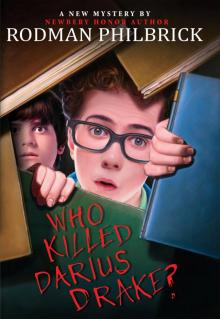 Who Killed Darius Drake?: A Mystery
Who Killed Darius Drake?: A Mystery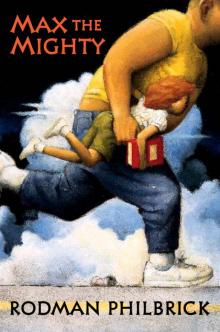 Max the Mighty
Max the Mighty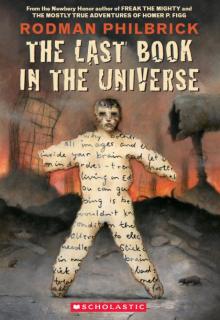 The Last Book in the Universe
The Last Book in the Universe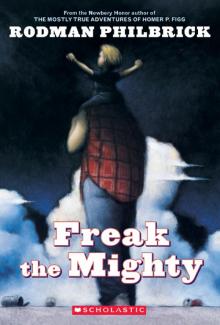 Freak the Mighty
Freak the Mighty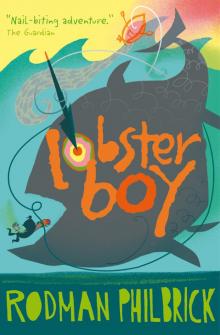 Lobster Boy
Lobster Boy Fire Pony
Fire Pony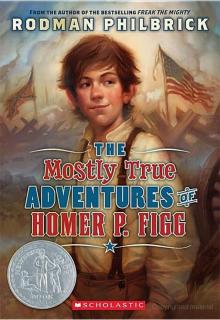 The Mostly True Adventures of Homer P. Figg
The Mostly True Adventures of Homer P. Figg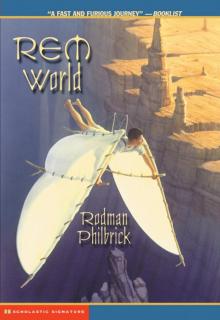 Rem World
Rem World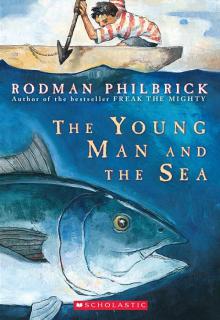 The Young Man and the Sea
The Young Man and the Sea Wildfire
Wildfire Coffins
Coffins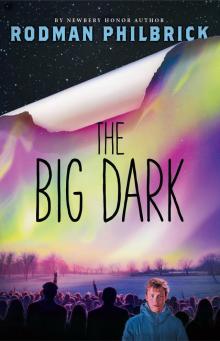 The Big Dark
The Big Dark Strange Invaders
Strange Invaders The Fire Pony
The Fire Pony The Haunting
The Haunting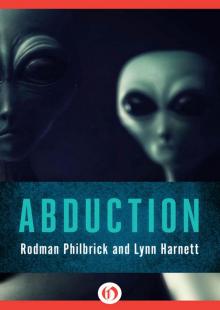 Abduction
Abduction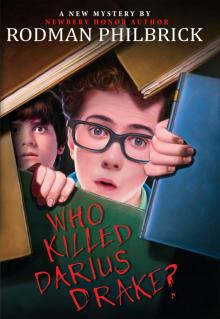 Who Killed Darius Drake?
Who Killed Darius Drake?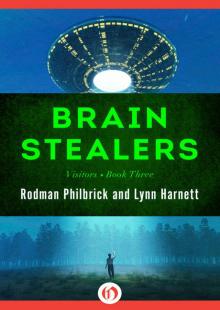 Brain Stealers
Brain Stealers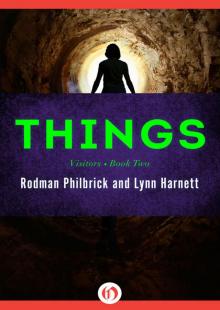 Things
Things Zane and the Hurricane
Zane and the Hurricane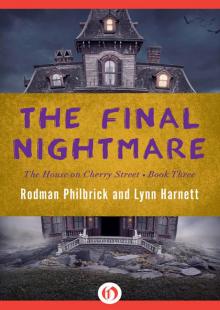 The Final Nightmare
The Final Nightmare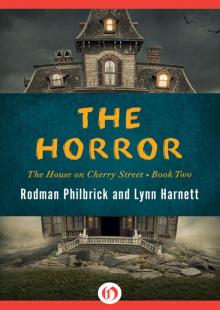 The Horror
The Horror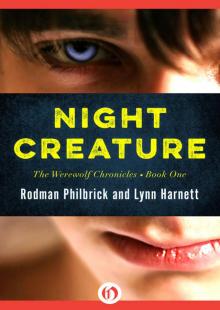 Night Creature
Night Creature Children of the Wolf
Children of the Wolf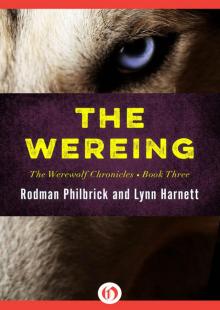 The Wereing
The Wereing